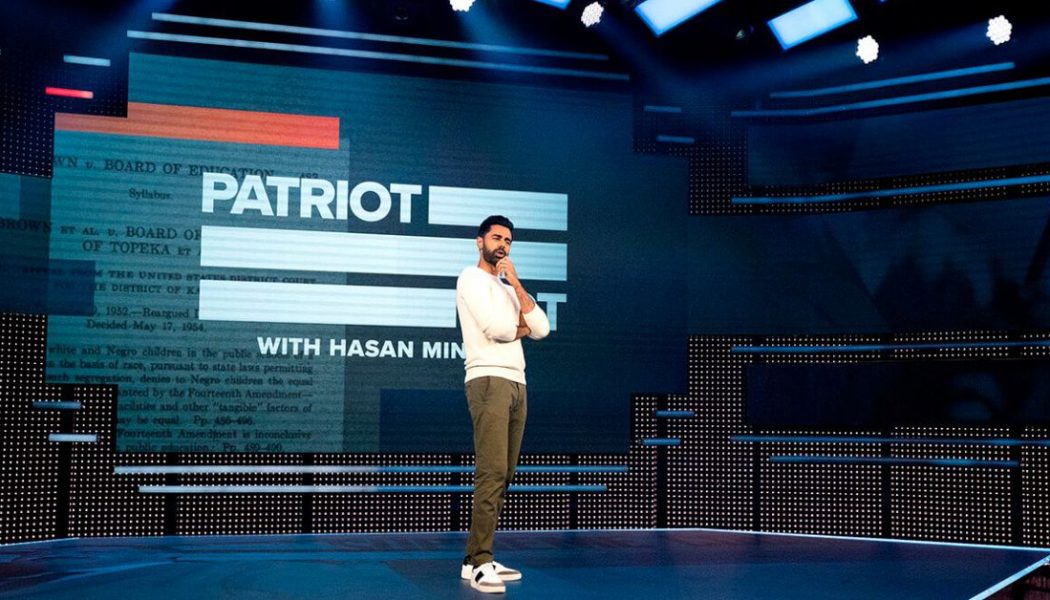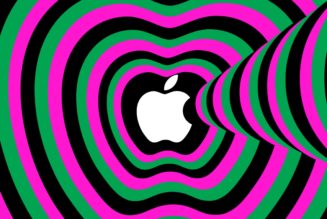
On Tuesday, comedian Hasan Minhaj announced that after two years and six seasons, Netflix canceled Patriot Act. Despite the unexpected axing, it’s a symptom of a larger ailment: streaming can do many things better than traditional broadcast television. Late-night shows are not one of them.
Patriot Act is different from a Tonight Show Starring Jimmy Fallon-type program or even some of the other more timely shows Netflix tried to get off the ground, including The Break with Michelle Wolf and The Joel McHale Show with Joel McHale. It was reminiscent of great Comedy Central late-night entertainment like The Daily Show, and it existed alongside Netflix series like Comedians in Cars Getting Coffee and My Next Guest Needs No Introduction with David Letterman. Netflix’s development team claimed this variation on the talk show format could work because it wasn’t tied to the news of the day. It seemed like the first talk show on Netflix to break through.
“With Hasan, Dave and Jerry, we have three distinct and original styles that are thoughtful and topical but have longer shelf lives than traditional linear shows,” Brandon Riegg, Netflix’s vice president of nonfiction series and comedy specials, told The New York Times last year.
At Netflix, Minhaj was left to explore. The streamer gave Minhaj a 32-episode order from the start, ordering an additional seven episodes in 2019. Like Last Week Tonight with John Oliver, Patriot Act took advantage of being a late night-style show without all the limitations of actually being a late-night broadcast show. The sociopolitical, oftentimes complex subjects he decided to focus on won Minhaj (and Netflix, by extension) a Peabody Award, an Emmy, and unending critical praise.
What a run. @patriotact has come to an end. I got to work with the best writers, producers, researchers, and animators in the game. My 2 babies were born and grew up with the show. TY to @Netflix and everyone who watched. Now it’s time to return these screens to Best Buy pic.twitter.com/4s4TrsKWe6
— Hasan Minhaj (@hasanminhaj) August 18, 2020
Why cancel a show that’s so celebrated? Ratings. But Netflix is infamously secretive about its numbers and often refuses to release statistics for its shows. The breakout hits act as good PR worthy of attention. For example, Chris Hemsworth’s Extraction nearly hitting 100 million streams around the world within its first four weeks is a big number Netflix wants printed. Other titles likely doing okay or not great at all is something the streamer wants to avoid publicizing. In other words, two things can be true at once: a show like Patriot Act could be beloved by people around the world and executives can admire it, but if it doesn’t pull in numbers, it gets scrapped.
With little information from Netflix, it’s the series cancellations that weave a story. The Break with Michelle Wolf, The Joel McHale Show With Joel McHale, and Chelsea were all canned after one or two seasons; Norm Macdonald Has a Show, The Fix, and My Next Guest Needs No Introduction with David Letterman haven’t generated the consistent type of online hype Netflix needs for people to return to the streaming service for those specific shows week after week. Patriot Act did generate conversation, and people seemed to tune in for Minhaj’s episodes. It just may not have been enough.
Herein lies the biggest issue: Netflix is trying to make a broadcast-specific genre of television work for a streaming audience. They’re two different beasts. Riegg told the Times last year that “the timeliness of the genre is a challenge for us as an on-demand service.” That is, in essence, true; talk shows are topical by nature. Guests are often there to promote books or movies they have coming out or are otherwise booked because of something that is currently happening. Being available daily also brings in advertising revenue for the networks and conditions an audience.
Even if they don’t tune in five days a week, people know that Good Morning America, The Tonight Show, and Ellen are on at the exact same time every single day. Talk shows become a consistent, ad-generating business for networks that need to fill time slots 24/7. But Netflix isn’t a topical, daily platform. People use it daily, but the algorithm is serving up sitcoms or movies they might be interested in, pushing them to continue using the service by offering titles that might make them stay an extra hour or two. It may be difficult for talk shows to break through the noise of thousands of other titles; some people might not see them on their homepage at all.
Talk shows also use YouTube to their advantage. Late-night hosts have become staples on YouTube as well as their own networks, with clips popping up on the Trending tab or appearing on people’s homepages. Minhaj shines here, too: Patriot Act’s YouTube channel has more than 1.3 million subscribers, and his videos routinely hit more than 1 million views. This includes full episodes uploaded to the site. Whether those videos push people to Netflix, however, and help the streamer grow subscribers is unknown. And everything at Netflix is about growing subscribers.
This is the core dilemma of Netflix’s cancellations. Even if a show is good or necessary, it’s a business transaction: does this series bring new viewers in and keep others from leaving? Patriot Act’s cancellation, then, isn’t a comment on Minhaj’s show — objectively one of Netflix’s best. It’s a reflection on Netflix’s current moment, one where the streamer is spending $18.5 billion a year on content, wading in new directions to see what sticks. Talk shows aren’t working. Their end is inevitable.










